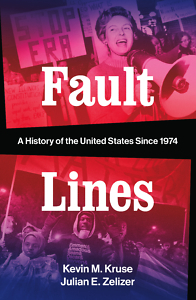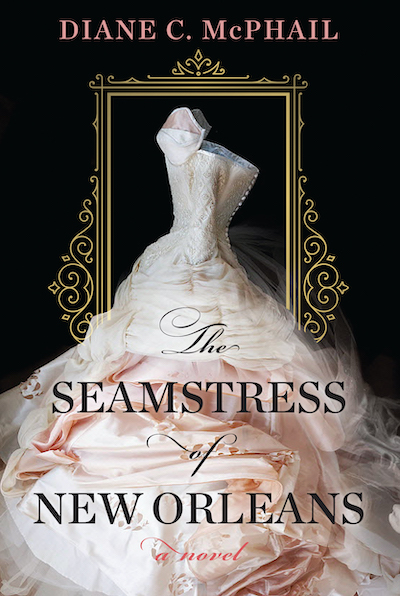How We Got Into This Mess
In Fault Lines, Kevin M. Kruse and Julian E. Zelizer explain the origins of political polarization
It appears that we, the American people, are more divided than ever. Flip on CNN and behold a reality-star-turned-president poking another hole in the national fabric with a poorly punctuated tweet. Click over to Fox and Friends and check out dangerous immigrant hordes infecting the populace. Impeach Trump! Build the wall! Abolish ICE! Lock her up! Obamaaaaaaaa!!!!

What has happened to us?
Kevin M. Kruse and Julian E. Zelizer have some answers. In Fault Lines: A History of the United States Since 1974, they skillfully navigate the recent American past, explaining the developments that have polarized our citizenry. Though politics occupy the central thread in this story, the book also discusses major changes in the economy, communication, and popular culture to explain how we got where we are.
This is smart history geared to wide audiences. Zelizer’s prolific output includes great books on American politics and frequent contributions to popular outlets such as CNN.com and The Atlantic. Kruse, a Nashville native, is not only the author of well-regarded books on modern conservativism, but also a master of the Twittersphere, bringing snappy historical perspective to his 235,000 followers. Fault Lines grew out of a popular course the professors teach together at Princeton University.
The book first traces the fissures that widened in the 1970s. In the wake of Vietnam and Watergate, political institutions lost legitimacy. The energy crisis and the decline of manufacturing jobs withered faith in the economy. The civil-rights movement forged opportunities for racial minorities but spawned contentious debates over economic justice. Feminists and gay activists demanded their rights, as well, and spawned a conservative backlash.
These waves eroded the political center. “Believing consensus was beyond reach, Americans sought to guarantee that different voices could be heard and divergent views could be seen,” write Kruse and Zelizer. “Abandoning the search for common ground in political and economic life, they increasingly valued competition and even conflict. From the 1970s on, the United States would seem less and less united with each passing decade.”
 By the 1980s, economic and cultural conservatives had reshaped the Republican Party as Ronald Reagan passed tax cuts, intensified the Cold War, and championed a patriotic ethos. But if “The Great Communicator” dominates the decade’s historical memory, Kruse and Zelizer call his presidency a “halfway revolution,” emphasizing the persistence of liberalism and outbursts of resistance during his years in office. In June 1982, for example, 700,000 people gathered in Central Park to demand a nuclear freeze.
By the 1980s, economic and cultural conservatives had reshaped the Republican Party as Ronald Reagan passed tax cuts, intensified the Cold War, and championed a patriotic ethos. But if “The Great Communicator” dominates the decade’s historical memory, Kruse and Zelizer call his presidency a “halfway revolution,” emphasizing the persistence of liberalism and outbursts of resistance during his years in office. In June 1982, for example, 700,000 people gathered in Central Park to demand a nuclear freeze.
George H.W. Bush and Bill Clinton tilted toward the center, but each occupied the Oval Office in an era of fragmentation. The fall of the Soviet Union created new uncertainties for American diplomacy. Battles over Supreme Court nominations grew more explicitly political. Meanwhile, cable television, personal computers, talk radio, and the internet fractured the way Americans received information.
The American people still craved messages of national unity. George W. Bush touted a “compassionate” form of conservatism and stirred a sense of American purpose in the aftermath of the September 11 attacks. But liberals howled at his ill-considered invasion of Iraq, embrace of the religious right, and bungled response to Hurricane Katrina. Similarly, during his history-making campaign in 2008, Barack Obama inspired widespread hope—but then came a massive financial crisis, bitter debates over the Affordable Care Act, and the rise of the far-right Tea Party. “Yes, we can,” Obama had proclaimed. No, it turns out, we couldn’t.
Fault Lines ends by illuminating the way Donald Trump has exploited the cracks in the American foundation. Mass popular culture—including reality shows like The Apprentice—blurred our definitions of truth. Diffuse media outlets sharpened the tools of fear and resentment. Culture wars supercharged the battles over Supreme Court appointments. People shouted about Trump’s ribald remarks and Hillary Clinton’s candidacy from across a canyon in gender politics. Race—as evidenced by the rise of both Black Lives Matter and the alt-right—highlighted our society’s fundamental dividing line.
Kruse and Zelizer don’t prescribe a cure for the nation’s ills, but they do provide a steady guide to modern American history. Fault Lines tells a lively story with fairness and insight, providing some order amidst our chaos. It’s a perspective we need as our national narrative keeps swerving down a jagged path.
 Aram Goudsouzian chairs the history department at the University of Memphis. His most recent book is The Men and the Moment: The Election of 1968 and the Rise of Partisan Politics in America.
Aram Goudsouzian chairs the history department at the University of Memphis. His most recent book is The Men and the Moment: The Election of 1968 and the Rise of Partisan Politics in America.


